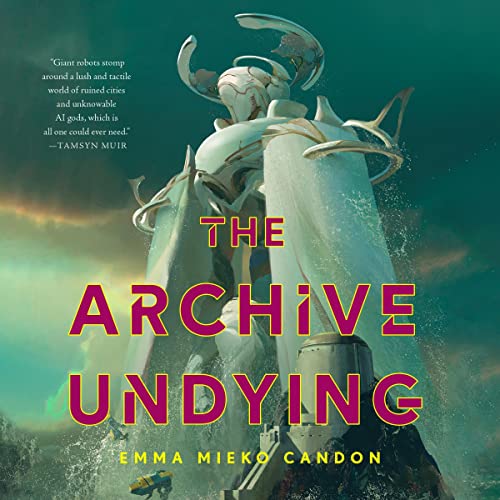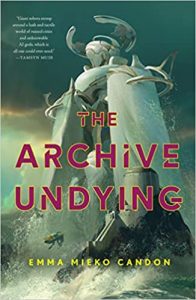 Mechanize My Hands to War by Erin K. Wagner
Mechanize My Hands to War by Erin K. Wagner Format: eARC
Source: supplied by publisher via NetGalley
Formats available: hardcover, ebook
Genres: artificial intelligence, dystopian, post apocalyptic, robots, science fiction
Pages: 320
Published by DAW on December 17, 2024
Purchasing Info: Author's Website, Publisher's Website, Amazon, Barnes & Noble, Kobo, Bookshop.org, Better World Books
Goodreads
The debut novel from Erin K Wagner is a chilling nonlinear sci-fi that examines androids as a labor force in conflict with both human farmers and homegrown militias in near-future Appalachia
Deep in the hills of Appalachia, anti-android sentiment is building. Charismatic demagogue Eli Whitaker has used anger toward new labor policies that replace factory workers with androids to build a militia–and now he is recruiting child soldiers.
Part of a governmental task force, Adrian and Trey are determined to put a stop to Whitaker’s efforts. Their mission is complicated by their own shared childhood experiences with Whitaker. After an automated soldier shoots a child during a raid to protect Trey, both grapple with the role of androids and their use in combat.
Interrelated with the hunt for Whitaker, farmers Shay and Ernst struggle after they discover their GMO crop seeds have failed and caused a deadly illness in Shay. To help manage, they hire android employees: Sarah as hospice, and AG-15 to work the now-toxic fields. The couple’s relationship to the androids evolve as both humans get progressively more sick.
Timely and chilling, Wagner's nonlinear debut shares intimate narratives of loss, trauma, and survival as the emergence of artificial life intersects with state violence and political extremism in rural Appalachia.
My Review:
I picked this up because I fell hard into the author’s debut novella, An Unnatural Life, and was hoping for more of the same. I absolutely got it with Mechanize My Hands to War, as this was both more in its continued exploration of a future relationship between humans and sentient AIs, and more literally, as I wished that An Unnatural Life had a bit more time to explore its variations on that theme and this book is nearly twice as long.
Which it absolutely needed to be to get all the things it needed to, even as tightly packed in layers as it turned out to be.
The outer layer of this story is a bit of a near-dystopia. Or a could-be apocalypse. It’s 2061 and the U.S. is on the brink of a whole lot of things that could go really, really pear-shaped. That the setting of this story isn’t all that far out from when we are now is definitely part of the point.
The surface story is about two senior agents from the Bureau of Alcohol, Tobacco, Firearms and Explosives – and it’s the “explosives” part of that mandate that has dragged the Bureau into this situation.
A private militia has been growing throughout the heartland, recruiting people who feel that the lives they have built have been stolen from them by a government that is poisoning the land of their farms with poorly tested chemicals and/or filling their factory jobs with robots.
They’re not exactly right – but they’re not exactly wrong, either. Howsomever, their methods are problematic in the extreme.
First, they’re stockpiling explosives, which always draws the ATF’s attention. Second, they are recruiting and training child soldiers, and that gets everyone’s attention even as it complicates every single one of the ATF’s operations.
Because no human wants to shoot a child – even if that child is aiming a weapon right at them.
The situation reaches a flash-point, figuratively and literally, when a robot DOES shoot a child while following its orders and its programming to the letter.
In the midst of the firestorm of controversy, no one is willing to even think the hard truth – that the problem, and the blame – rest not with the programmed unit Ora, but with the humans who programmed him.
 Escape Rating A: The story, the outer layer of it at least, is deceptively simple. And then things get really complicated, both in the story itself and in what’s hiding underneath it. Whenever I stop to think about it for even a minute, more ideas pop to the surface and swim underneath.
Escape Rating A: The story, the outer layer of it at least, is deceptively simple. And then things get really complicated, both in the story itself and in what’s hiding underneath it. Whenever I stop to think about it for even a minute, more ideas pop to the surface and swim underneath.
On the surface, that single story is already multiple stories. The first is the story of the extremely uncivil war between the Civil Union Militia and the ATF as proxy for the entire U.S. government. But underneath that layer, there’s the breakdown of the U.S. into factions, an extension of the tension between the cities and the heartland, that already exists.
A conflict that is exacerbated by the presence of robots as factory workers, mail carriers, and home health aides, doing any job that can be programmed reasonably effectively. But also as soldiers – and cops.
And that’s where Mechanize My Hands to War does what science fiction does best. Because on the surface that story is simple enough. The robots ARE, in fact, replacing humans in a lot of jobs, displacing a lot of people who had work that did not require a higher education, and not leaving nearly as many such jobs behind as there are people who need them. It’s a fear that has been played out recently in both the Writers Guild of America/Screen Actors Guild strike of 2023 and the Dockworkers’ strike of October 2024.
But the robots and the AIs did not create and program themselves to do these jobs and replace those workers. (They might, someday, but that would be a different story entirely – or a later one.) The robots are merely an easier and more reachable target for those who have been negatively impacted by the changes.
They represent the scapegoat that people are supposed to focus on, so they don’t attack who is really responsible – the corporations who have studied the calculus of profitability and know that replacing five humans with one human and four robots is better for their bottom line.
And it’s easy to see the robots of this story as the immigrants in today’s screaming – and all too frequently erroneous – headlines.
Which is where the story turns back upon itself into that original SFnal premise. Just because the robots were intended to be self aware but not sapient, does not mean that they have not evolved beyond their programming. That the more that the programmers attempt to create a complicated enough decision making matrix for the units, one that would keep another robot from killing another child even though that child is a clear threat, the more independent thought processes the robots have to work with.
The place where THAT might lead gives the story an open-ended and very SFnal ending. But the points that it raised keep dancing around in my head. As the best science fiction stories absolutely do.

 Unexploded Remnants by
Unexploded Remnants by  The Archive Undying (The Downworld Sequence, #1) by
The Archive Undying (The Downworld Sequence, #1) by  Escape Rating B: I listened to The Archive Undying in its entirety, and I have to say that its the narrator that carried me through all SIXTEEN AND A HALF HOURS. The narrator didn’t just do a good job of voicing all the many, many characters, but by literally being in their heads and not my own it allowed me to care enough about the individuals to be willing to experience the whole constantly twisting saga. If I’d been reading this as text, if I’d been in my head instead of theirs, I’d have DNF’d fairly early because the sheer number of changes in perspectives combined with unsatisfying hints of the world they occurred in would have driven me mad in short order. YMMV.
Escape Rating B: I listened to The Archive Undying in its entirety, and I have to say that its the narrator that carried me through all SIXTEEN AND A HALF HOURS. The narrator didn’t just do a good job of voicing all the many, many characters, but by literally being in their heads and not my own it allowed me to care enough about the individuals to be willing to experience the whole constantly twisting saga. If I’d been reading this as text, if I’d been in my head instead of theirs, I’d have DNF’d fairly early because the sheer number of changes in perspectives combined with unsatisfying hints of the world they occurred in would have driven me mad in short order. YMMV.